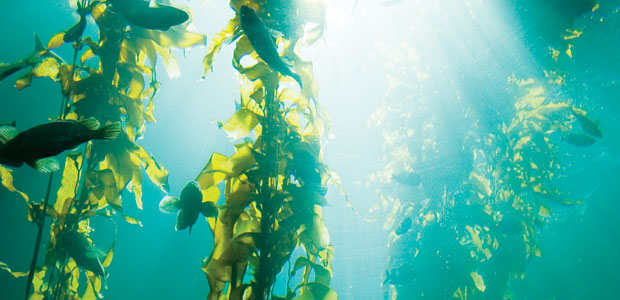Advertisement
An Explosion of Iodine
In 1811, during the manufacture of gunpowder, Barnard Courtois made a great discovery. He added too much sulfuric acid to burnt seaweed (a component of gunpowder), releasing a purple vapour that created dark crystals on cold surfaces. He had just accidentally discovered iodine. Iodine occurs naturally as dissolved iodide in seawater. Kelp and some other … Continued

In 1811, during the manufacture of gunpowder, Barnard Courtois made a great discovery. He added too much sulfuric acid to burnt seaweed (a component of gunpowder), releasing a purple vapour that created dark crystals on cold surfaces. He had just accidentally discovered iodine.
Iodine occurs naturally as dissolved iodide in seawater. Kelp and some other plants contain concentrated amounts of iodine, which allows the nutrient into our food chain.
Teamwork
In our bodies, iodine is an essential trace element. Thyroid hormones called thyroxine (T4) and triiodothyronine (T3) contain iodine, which is absorbed from the blood. T4 and T3 contain four and three atoms of iodine per molecule, respectively. Thyroid-stimulating hormone (TSH) is released from the pituitary gland and regulates production of T3 and T4 and their release into the blood.
The thyroid gland uses iodine to influence body temperature, weight gain, and energy levels. The best sources of iodine include sea vegetables (kelp, dulse, wakame, and hijiki), fish, and shellfish.
Keep an Eye on the Iodine
Recent studies have linked low thyroid function (hypothyroidism) and/or iodine deficiency with fibrocystic breast disease and breast cancer. Clinical treatment has helped to decrease breast pain, breast nodules, and cysts in patients with normal thyroid levels. This suggests that iodine deficiency and/or subclinical hypothyroidism (symptoms of hypothyroidism with normal TSH blood levels) may be a factor in fibrocystic breast disease and breast cancer.
It is thought that a lack of iodine in the breast tissue makes the epithelium more sensitive to estrogen. The excess estrogen can cause excess secretions from the breast cells to distend the breast ducts, which causes small cysts and the potential for fibrosis (hardening of the tissue).
Certain forms of iodine have been shown to return the cystic spaces to a healthy size and reverse fibrocystic breast disease, according to a study published in the Canadian Journal of Surgery (1993). The dosage of elemental iodine used was 70 mcg to 90 mcg per kilogram of body weight. When taking elemental iodine, there may be a short term increase in breast pain due to the softening of the breast and the fibrocystic plaques.
Richness from the Ocean
All ocean plants are rich in nutrients and can contain up to 10 to 20 times the minerals of land plants. These nutrients include protein, essential fatty acids, sodium and potassium salts, and other trace minerals essential for proper thyroid function.
Also known as bladderwrack due to the bladder-shaped air pods that help the plant to float, kelp (Fucus vesiculosu) has a yellow-brown pigment and can grow up to 1,500 feet long in cold climates.
A 100-g dose of kelp contains 16 g of protein and 1,100 mg of calcium. Comparatively, 250 g of almonds contain 660 mg of calcium, while 250 g of cows’ milk contains 300 mg of calcium. Kelp also contains alginic acid, which has been shown to protect the body from the effects of radiation.
A Useful Weed
Some studies have shown that kelp helps reduce obesity, heart disease, arthritis, rheumatism, thyroid disease, constipation and digestive concerns, infectious diseases, cholesterol levels, and blood pressure. However, if you have any of these conditions, check with your health care provider before you begin taking high doses of kelp.
Iodine in kelp intensifies the body’s ability to burn fat through exercise, increases stamina, and allows the cells to use energy more efficiently.
Kelp is a hearty herb commonly added to soups and grains due to its salty flavour and high mineral content. It has also been shown to improve the digestion of beans. Kelp should be used minimally or avoided during pregnancy due to the possibility of causing loose stool.
How Much Iodine Do We Need?
The recommended daily allowance for iodine varies with each life stage.
Infants
Birth to 6 months 40 mcg
6 months to 1 year 50 mcg
Children
1-3 years 70 mcg
4-6 years 90 mcg
7-10 years 120 mcg
Adults
11+ years 150 mcg
Pregnant women 175 mcg
Lactating women 200 mcg





